Few sports are as synonymous with the nation of Ireland as boxing. Like the Tolkien-esque landscape, the malty red ale, and the rich folk music, boxing is a staple of the nation. Not only do Irish people love to watch big prize fights, they also love to participate—and dominate—in the sport. The nation has nabbed 31 Olympic medals overall, and over half of those wins (16) were earned by boxers, including two golds.
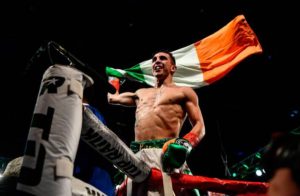
The Emerald Isle has a long association with the sport of boxing, producing heavyweight greats like Jimmy McLarnin and Steve Collins. Interestingly, however, it was Irish-American boxers who popularized the sport when they brought it back with them to Ireland. Though the modern form of boxing we practice today was born from U.K. prizefighting, Ireland didn’t really enter the ring, so to speak, until Irish immigrants began fighting stateside.
This is only a small part of the story, though. From the equipment we wear to our most fundamental boxing training techniques, boxing has changed a lot over the years. To understand how the sport took off there over 100 years ago, we should look at a brief history of boxing in Ireland.
A Brief History of Irish Boxing
- Pre-1850s – Boxing Without Gloves: Before the 1850s, boxing was in the midst of what’s known as the “bare-knuckle era” (no gloves required), which persisted in England until the London Prize Ring Rules were established in 1838. The new rules carved out acceptable fighting behavior. This form of boxing spread wildly among the British armed forces, police, and public schools of England. It is believed that boxing was introduced to Ireland during this time by members of the British army.
- 1850s – Irish-Americans Learn to Box: The Great Famine of Ireland sent over a million Irish people into mass migration, with many relocating to the U.S. In Boston and New York, where the sport had already taken off, Irish immigrants began boxing as a hobby. In 1853, the Irish-born pugilist John Morrissey won a match against Irish-born bare-knuckle fighter Yankee Sullivan. That fight helped jump-start the Irish-American obsession with boxing. Interest traveled back home to Ireland.
- 1867 – The Marquess of Queensberry Rules Are Drafted: As the sport took off in the States, boxing was evolving into a more official (and officially governed) sport back in England. In 1867, the Marquess of Queensberry Rules were published in an effort to make the sport safer and fairer. They were the first rules to mandate the use of boxing gloves in competition. These rules are still used today and even governed the headline-making Mayweather vs. McGregor matchup in 2017.
- 1911 – The Irish Athletic Boxing Association Is Formed: The first official boxing association wasn’t formed until 1911 with the official creation of the Irish Athletic Boxing Association (IABA). In 1939, the IABA built the very first purpose-built boxing stadium in the world, the National Stadium in Dublin, which still operates under the IABA today. The organization serves as the national governing body for amateur boxing in Ireland to this day.
- 1914 – War Quells the Sport, Independence Propels It: In early 1900s-era Ireland and England, boxing was dominated largely by the armed forces. When both countries were called to duty at the start of World War I, as well as the subsequent Irish War of Independence beginning in 1919, the development of the sport was put on hold. When Ireland won independence, boxing again rose to popularity within the army.
- 1928 – Ireland Competes in the Olympics: As an independent nation, Ireland became eligible to send a team to the Olympic Games in Amsterdam. In 1928 they sent eight boxers to the Games, the first year they were able. Unfortunately, the country didn’t earn a medal in Olympic boxing that year. In fact, it would be more than two decades before they earned a medal in boxing and over 60 years before they brought home a gold in the sport.
- 1952 – Ireland Wins Its First Olympic Medal in Boxing: In 1952, the Emerald Isle took home its very first Olympic medal in the sport, with bantamweight competitor John McNally earning the country its first silver medal.
- 1992 – Ireland Wins Its First Gold in Boxing: Finally, in the 1992 Olympic Games in Barcelona, Ireland nabbed its first gold medal in boxing, with Michael Carruth earning the welterweight title that year.
The Fighting Irish: Boxers Who Rule the Ring
Now that we have an understanding of Ireland’s history with boxing, it’s time to take a look at some of the prizefighting pioneers who brought boxing into the limelight over the past 200 years. Here are some of the most noteworthy Irish and Irish-born boxers, in order of their birth.
- John L. Sullivan (1858-1918) – One of boxing’s early heroes, Irish-American boxer John Lawrence Sullivan earned the title of the first heavyweight champion of the gloved era and held the title from 1882 to 1892. Born in Boston to Irish parents, Sullivan—nicknamed the “Boston Strong Boy”—is also widely recognized as the final heavyweight champ of the bare-knuckle era, governed by the London Prize Ring Rules. Out of his 44 total career fights, Sullivan won 34 of those by KO and lost only one.
- Jake Kilrain (1859-1937) – Much like John Sullivan, Jake Kilrain was an Irish-American boxer who straddled the line between old- and new-era fighting, earning titles with and without boxing gloves. One of the pugilist’s most famous bouts was against Sullivan during the tail end of the bare-knuckle period. The Kilrain-Sullivan matchup was listed as one of the greatest pre-modern era boxing fights in history. Though Kilrain lost the match, he forged an impressive reputation as a hard-hitting scrapper. He was eventually elected into the Bare Knuckle Boxing Hall of Fame in Belfast, NY and the International Boxing Hall of Fame in Canastota, NY.
- Paddy Duffy (1864-1890) – The Irish-American boxer Paddy Duffy was one of the earliest noteworthy pugilists to earn the nation its boxing reputation. Born in Boston to Irish parents, Duffy is thought to have picked up the sport around 1883. Though the welterweight died from tuberculosis at age 25, he earned his place in history books, and in the International Boxing Hall of Fame, for being the first world welterweight champion of the gloved era. Duffy is said to have lost only two fights during his career.
- Tom Sharkey (1871-1953) – As far as impressive boxing records go, Tom Sharkey’s ranks high. With 40 wins, including 37 KOs, Sharkey crushed it in the heavyweight class of the early gloved era. Well-known around the world for his powerful punch and prominent cauliflower ear, Sharkey made headlines after his controversial fights with heavyweight Bob Fitzsimmons in 1896, and then James J. Jeffries in 1899.
- Jack Dempsey (1895-1983) – Though he was only partly of Irish descent, famed boxer Jack Dempsey was one of the most significant Irish-American figures of the early 1900s, not just in the sport of boxing, but in culture at large. Nabbing two titles in light heavyweight and heavyweight classes, Dempsey was best-known for his aggressive fighting style and extremely powerful punch. Becoming something of an American icon during the 1920s, Dempsey set several records, in terms of earnings and attendance. One of his fights was the first boxing gate to pull in over $1 million. Two of his highly publicized square-ups against Gene Tunney also scored million-dollar gates.
- Gene Tunney (1897-1978) – Born in Kiltimagh, County Mayo, Gene Tunney picked up boxing after emigrating to the U.S. amid the Great Famine. Tunney held the title of world heavyweight from 1926 to 1928, in addition to earning the title of American light heavyweight twice. To boxers, Tunney is best-remembered for his highly technical style and his fast boxing footwork. His legacy is also marked by his well-publicized rivalry with Harry Greb, and his two-time defeat of Jack Dempsey, also of Irish descent.
- James J. Braddock (1905-1974) – Though his most famous nickname was “Cinderella Man,” boxer James J. Braddock was also dubbed the “Pride of the Irish.” Braddock was born to Irish immigrants in New York City, where his early ambition was to play football at Notre Dame. As chronicled in the 2005 Oscar-winning biographical drama “Cinderella Man,” Braddock suffered several hand injuries as a result of boxing and was forced to work as a longshoreman to support his family in the midst of the Great Depression. Despite this, the boxer made a huge comeback, and—spoiler alert—won the heavyweight title against Max Baer in 1935.
- Jimmy McLarnin (1907-2004) – No doubt one of the very best, Irish-Canadian boxer Jimmy McLarnin earned himself two welterweight world championship belts and the title of third-greatest welterweight of all time. Because he didn’t know where he was born, he had two nicknames—the Dublin Destroyer and the Belfast Spider—believing he was either from Dublin or Belfast. Later, boxing historian Patrick Myler tracked down his birth certificate and discovered that he was actually born in Hillsborough, County Down, Northern Ireland.
- Barry McGuigan (1961- ) – The WBA and lineal featherweight champion Barry McGuigan earned 28 wins by KO during his boxing career and fought for Ireland in the 1980 Olympics. McGuigan was born in Clones, County Monaghan and was nicknamed the “Clones Cyclone.” Later, McGuigan entered the world of boxing promotion and founded the Professional Boxing Association, of which he is currently president.
- Steve Collins (1964- ) – Though he spent his early competition years dominating the American boxing circuit, Irish middleweight Steve Collins earned himself the nickname “Celtic Warrior” for winning the Irish middleweight title in 1988. Collins has also won the WBO middleweight champion and WBO super-middleweight champion and is, by and large, considered one of the most successful pro boxers in Irish history. His boxing record is quite impressive, with 36 wins out of 39 fights and 21 wins by KO.
- Wayne McCullough (1970- ) – Hailing from Northern Ireland, pro boxer Wayne McCullough is considered one of the best boxers of the modern era. He made a name for himself in the ring throughout the 1990s and early 2000s, nabbing the WBC bantamweight title, as well as titles in the super-bantamweight and featherweight classes. McCullough competed for Ireland during the 1992 Summer Olympics, earning the country a silver medal in bantamweight. McCullough has lost seven of 34 fights, but he has never once lost by knockout during his professional career.
- Conor McGregor (1988- ) – Though he’s mostly known as one of the top fighters in UFC—his record of 18 wins by knockout has earned him the featherweight and lightweight titles—McGregor isn’t just an MMA monster. He’s also technically a pro boxer, at least after squaring up against Floyd Mayweather in 2017 during a match dubbed “the biggest fight in combat sports history.” The spectacle earned McGregor over $100 million, making him one of the highest-paid fighters around. Competing for SBG Ireland, McGregor was born in Dublin and was raised in the working-class neighborhood of Crumlin. He is undeniably one of the most famous and most recognizable fighters of modern day—not just in Ireland, but throughout the world.
Recognizing the Irish for Contributions in Boxing
The above list is by no means comprehensive, and there are many more title-earning greats that hail from Ireland. As you can tell, there’s no denying that the country has had a serious impact on the world of boxing, especially in America. The land’s ability to produce great boxers isn’t a coincidence. The best fighters of Irish descent share an undeniable tenacity, scrappiness, and commitment to making it to the top. The sport of boxing owes a lot to these Irish- and Irish-American trailblazers of the ring!
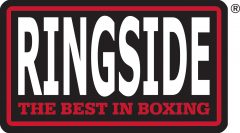

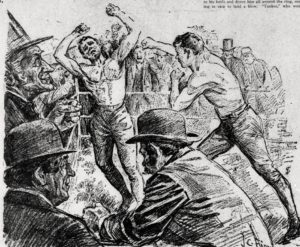
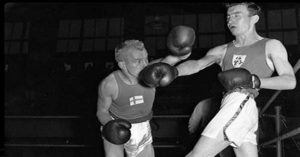
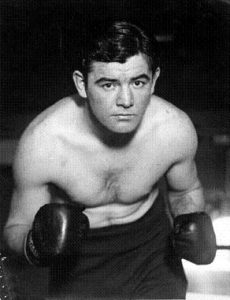
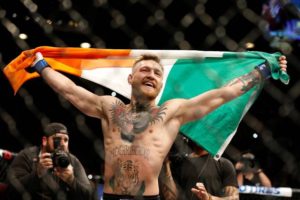
Also, Muhammad Ali is claimed to have an Irish grandfather or great grandfather and his daughter is married to an Irish-American.